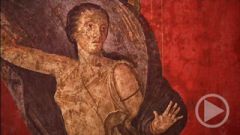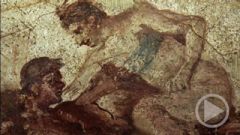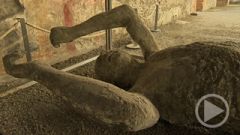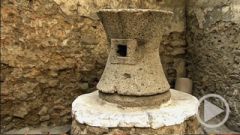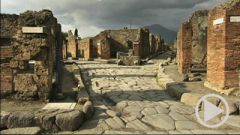Freedmen and Patricians, Men and Women: Power and Politics
Power and Politics
The road back into town is lined with graves – like all roads outside the gates of Roman cities, for it is forbidden by law to bury the dead within the town walls. Here, too, the upper classes use the opportunity to show off. Many of the larger monuments are graves honouring respected citizens – like this one for Calventius Quietus. Within its walls are the unadorned graves of his family members. Roman social structures persist after death – so, as in their lifetime, the rich are surrounded by a cluster of dependents. What's remarkable about this grave is that although the monument looks like that of a noble landowner – his name suggests that Calventius Quietus must have once been a slave. Freed slaves had nearly full citizenship rights. Rome was a capitalist society – and those who were successful could climb the social ladder.
A little further on - the grave of Aulus Umbricius Scaurus. His family became fabulously wealthy from manufacturing garum, the fish-based condiment. He, too, must have been a descendent of former slaves, yet the inscription proudly states that he made it to the highest office in the city of Pompeii – he was a 'duumvir'.
The 'duumviri iure dicundo' – literally 'the two men with the authority to pronounce justice' – were the two chief magistrates of the community. And this is where they may have pronounced the law: on the podium in the basilica. The great hall on the Forum was the venue of court cases, and it was where people came together to discuss business and politics. New duumviri are elected each year. As with most important posts, two office holders exercise their authority jointly – both supporting and monitoring each other. The duumviri are at the peak of this status-conscious society. They enjoy huge prestige – they represent Pompeii in Rome before the officials and even the emperor.
The electioneering slogans preserved on walls throughout the city have been a boon to historians. Every year, new names were written over the old ones. By following the layers of paint it is often possible to say who was who in Pompeian politics in a given year. However, it’s unclear how extensive these election campaigns actually were.
Pompeii is a small town; everybody knows everybody. And voters tend to elect the ones they always do– namely the sons of established, influential families. Plus a handful of nouveau riches, who traditional society may scorn but who can’t be excluded. After all they fulfilled the main requirements for public office: that candidates be adult males who are free-born from a 'respectable family' And that means, they had to be rich. Public posts were generally not lucrative.
On the contrary - Prof. Karl-Wilhelm Weeber, Wuppertal/Witten:
"The upper class was expected to – and did – see it as a duty to show generosity toward the common people and toward the city. Much of what we would see today as the responsibility of the municipal administration was financed by wealthy citizens. You could say it was like the American approach."
One of the important duties of the duumviri was to finance public buildings. For example, the Odeon, a small musical theater which once had a wooden roof and excellent acoustics, was commissioned by Caius Quinctius Valgus and Marcus Porcius – for which they are lauded on the inscription, right next to the architect.
Just like today, some projects spiraled out of control. Our old acquaintance Marcus Holconius Rufus, who was duumvir five times, had the temple of Apollo enlarged – and had to pay a small fortune in damages to a neighbour who sued because the larger temple blocked the sunlight.
The office of the duumviri is directly in the Forum. Next to it is the Curia, or council hall. In the council of the city fathers –the ordo decurionum – the 100 most important men of the town make decisions on the budget and taxes. But the daily business is in the hands of a 'public slave' – another indication of the high status that slaves can achieve in society. However, although freedmen – that is, former slaves – had the right to vote, only free-born Romans could be elected to public office. That explains this inscription on the Temple of Isis: Numerius Popidius Celsinus, it reads, renovated the temple and was accepted out of gratitude into the town council – aged six years old! Here an ambitious freedman was ensuring his son’s entry into elite society.
Next to the Curia - the office belonging to the two 'Aediles'. They are also elected every year. They are in charge of public order, they maintain the city streets, act as police chiefs and oversee the markets. Here at the Forum customers can check for themselves whether the vendors are abiding by the law – the weights and measures are standardized.
All public posts were restricted to men – no woman was allowed to run for office. Women had few rights. They were entirely subordinate to their pater familias. But as usual, real life was often different from theory. Women ran shops and taverns, some of them owned entire blocks of houses. And although they themselves could not vote, women advertised on posters for the candidates of their choice. A tomb just outside the Herculaneum Gate invites passers-by to stop for a rest and read the inscription. Surprisingly, the imposing monument commemorates a woman named Mamia. And the largest of all tombs discovered at Pompeii is dedicated to a female named Eumachia.
This influential woman commissioned one of the largest buildings at the Forum. It was the guild house of the fullers – the tradesmen who laundered clothes and washed wool – and they honoured their patroness with a statue. Eumachia held the only position of power that was available to women – she was a priestess.


